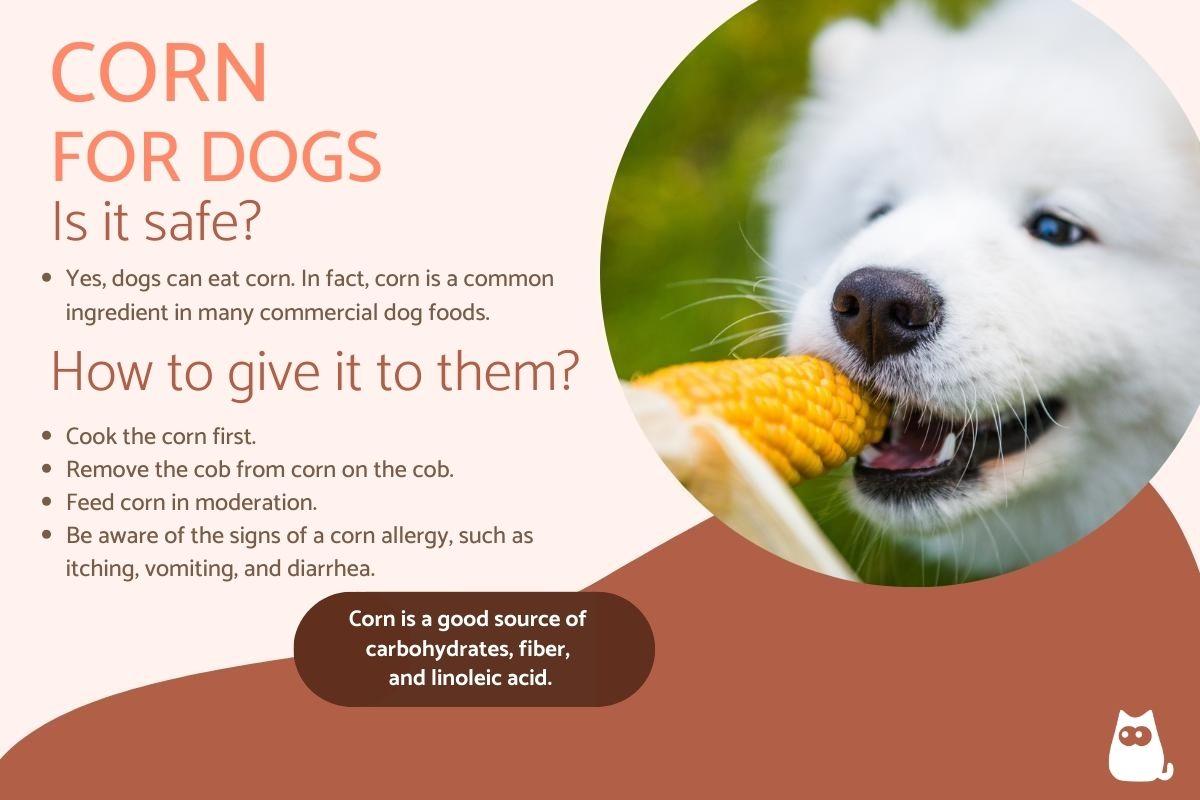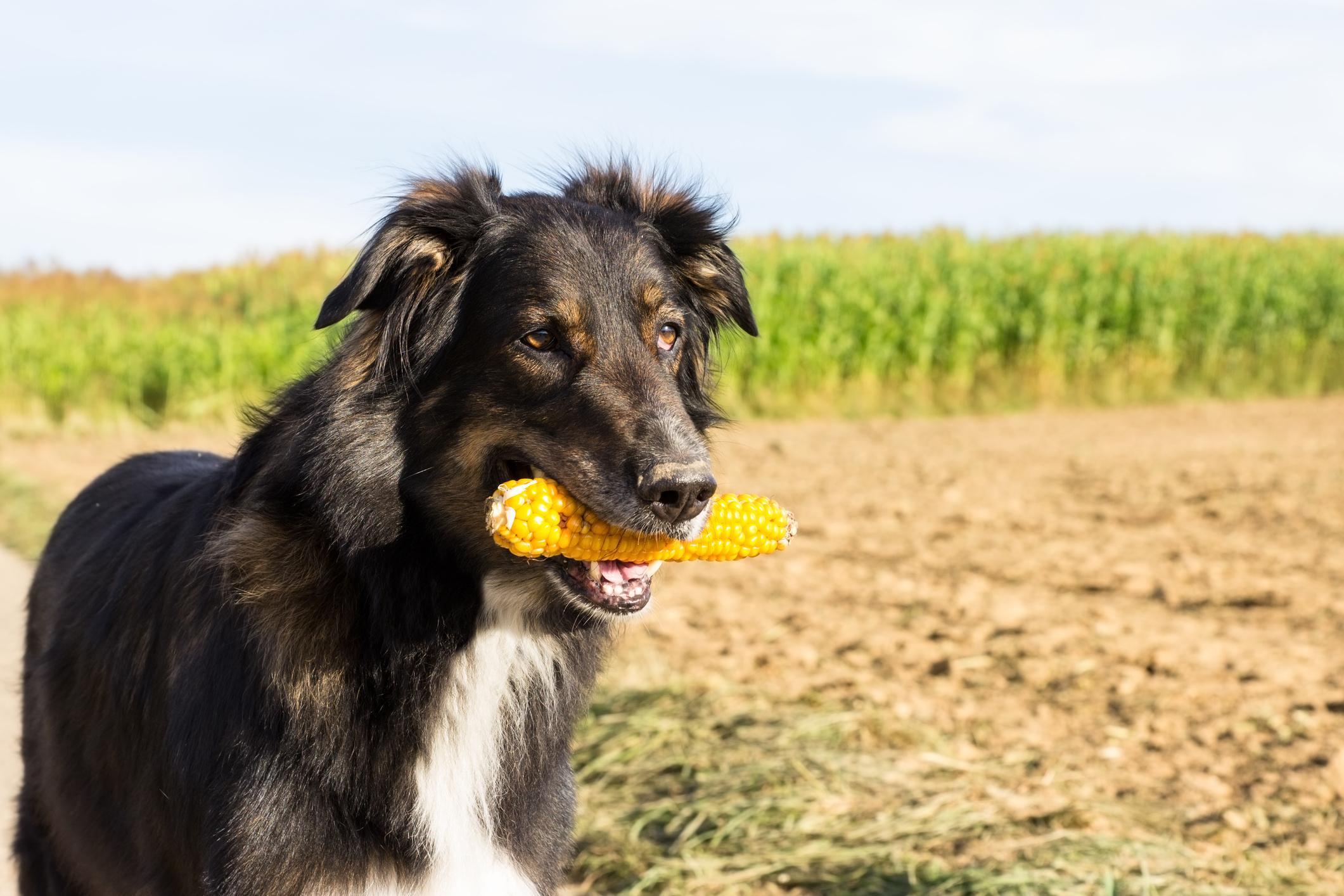Corn for Dogs - Benefits, Risks, and How to Feed It



See files for Dogs
Corn is a popular food that is often used in commercial dog foods. However, many pet owners are wondering if corn is safe for dogs to eat. The short answer is yes, corn can be a safe and healthy snack for dogs in moderation. However, there are some important things to keep in mind before giving corn to your dog.
In this AnimalWised article, we will discuss if corn is safe for dogs. We'll also explore the potential benefits of corn for dogs, recommended dosages, the best ways to introduce it into their diet, and also discuss possible contraindications and side effects.
Can dogs eat corn?
Yes, dogs can eat corn. In fact, corn is a common ingredient in many commercial dog foods. However, it is important to note that corn should not be the primary ingredient in a dog's diet, as it is not as nutritionally complete as other foods, such as meat or fish.
Corn is a good source of carbohydrates, fiber, and linoleic acid, which is an essential fatty acid. However, it is also high in starch, which can be difficult for dogs to digest. Additionally, corn can sometimes trigger allergies in dogs.
If you do choose to feed your dog corn, keep in mind that corn should not be a significant part of your dog's diet, as dogs have specific nutritional needs that are best met with a balanced dog food. It should only be offered as an occasional treat.
Benefits of corn for dogs
Corn is a common ingredient in commercial dog foods, and it can offer some benefits for dogs, including:
- Energy source: corn is a good source of carbohydrates, which provide energy for dogs.
- Fiber: corn is also a good source of fiber, which can help to keep dogs' digestive system healthy.
- Essential fatty acids: corn is a good source of linoleic acid, which is an essential fatty acid that is important for dogs' skin and coat health.
- Antioxidants: corn contains antioxidants, such as beta-carotene and vitamin E, which can help to protect dogs' cells from damage.
- Nutrient variety: corn contains various vitamins and minerals, including vitamin B3 (niacin), vitamin B6, and potassium. These nutrients can support overall health.
- Low fat: corn is relatively low in fat, making it suitable for dogs on low-fat diets or those prone to obesity.
- Protein: Corn contains some protein, which is a crucial component of a dog's diet. While corn protein isn't as high in quality as animal-based proteins, it still contributes to a balanced diet.
It's critical to note that while corn can provide these benefits, it should be fed in moderation and as part of a balanced diet. Dogs primarily require high-quality animal-based protein for optimal health. Corn should not replace the protein content of a dog's diet, but can complement it.
Read our article on a healthy diet for dogs to find out what foods to feed your dog and what to avoid.

How to give corn to my dog?
To safely give corn to your dog, follow these guidelines:
- It is always best to cook the corn first before giving it to your dog. Raw corn can be difficult for dogs to digest. Cook the corn by boiling, steaming, or microwaving it.
- In general, it is best to remove the cob from corn on the cob. The cob can be a choking hazard for dogs. If you are giving your dog corn on the cob, be sure to remove the cob after they have eaten all the kernels.
- It is also advisable to cut the corn into small pieces. This will make it easier for your dog to chew and digest the corn.
- As mentioned before, corn is a high-starch food, and too much corn can cause digestive problems for dogs. Start by giving your dog a small amount of corn and gradually increase the amount if they tolerate it well.
- Be aware of the signs of a corn allergy. Some dogs may be allergic to corn. If you notice that your dog is experiencing any negative side effects after eating corn, such as itching, vomiting, or diarrhea, stop feeding them corn and talk to your veterinarian.
Remember that corn should not replace your dog's regular, balanced diet, and it should only be an occasional treat.
Can dogs eat raw corn?
Yes, dogs can eat raw corn, but it is not recommended. Raw corn can be difficult for dogs to digest, and it can also be a choking hazard. If you do choose to give your dog raw corn, be sure to supervise them closely and remove any uneaten corn kernels.
Can dogs eat oven-roasted corn?
Yes, dogs can eat oven-roasted corn. However, it is best if you remove the cob from the corn before feeding it to your dog, since the cob can be a choking hazard. Also, make sure to cut the corn into small pieces, this will make it easier for your dog to chew and digest the corn.
Can dogs eat sweetcorn?
Yes, dogs can eat sweetcorn, but it is important to do so safely. Sweetcorn offers valuable carbohydrates, fiber, and essential fatty acids like linoleic acid. Nevertheless, it's essential to be aware that sweetcorn contains a high starch content, which can pose digestion challenges for dogs.
Can dogs eat canned corn?
Yes, dogs can eat canned corn, but it is important to do so in moderation. Canned corn is high in sodium and sugar, which can be unhealthy for dogs in large quantities.
Can dogs eat corn tortillas?
Yes, dogs can eat corn tortillas in moderation. It's advisable to tear the tortillas into smaller pieces and incorporate them into your dog's regular meals. You can also stuff the tortillas with dog-friendly fillings like peanut butter, mashed banana, or cooked chicken for a tasty treat.
Can dogs eat popcorn?
Yes, dogs can eat popcorn, but it is important to do so in moderation. Plain, air-popped popcorn is a good source of fiber and some vitamins and minerals, but it is also high in carbohydrates and can be a choking hazard.
Curious about whether or not corn is safe for cats? Read our other article to learn more.
Recommended dosage of corn for dogs
The recommended dosage of corn for dogs depends on their size and activity level.
As a general rule of thumb, you can give your dog a small amount of corn as a treat, but it should not be more than 10% of their daily diet. Keep in mind that corn is relatively high in carbohydrates, so excessive consumption can contribute to weight gain or digestive issues.
If you are unsure how much corn to give your dog, it is always best to consult with your veterinarian. They can help you determine the appropriate amount of corn for your dog's individual needs.
Side effects of corn for dogs
The side effects of corn for dogs can vary depending on the individual dog and the amount of corn consumed. Some common side effects include:
- Digestive problems
- Allergies
- Itching
- Hives
- Skin irritation
- Weight gain
- Increased risk of pancreatitis
In rare cases, corn can cause a more serious condition called corn toxicosis. Corn toxicosis is a condition that can occur in dogs after they have consumed a large amount of corn. It is characterized by weakness, lethargy, vomiting, and diarrhea. In severe cases, it can lead to death.
The exact cause of corn toxicosis is unknown, but it is thought to be related to the high levels of starch and mycotoxins in corn. Mycotoxins are toxins produced by fungi that can grow on corn.
If you suspect that your dog may have corn toxicosis, it is important to seek veterinary attention immediately. Treatment typically involves supportive care, such as intravenous fluids and anti-vomiting medication.
Learn about the signs and symptoms of pancreatitis in dogs, and how to get help in this other article.
Contraindications of corn for dogs
Corn is a safe and healthy snack for dogs in moderation, but there are some contraindications to consider. Here are a few conditions where corn should not be given to dogs:
- Allergies: some dogs may be allergic to corn. Symptoms of a corn allergy can include itching, vomiting, diarrhea, and skin irritation. If you notice any of these signs after feeding your dog corn, stop feeding it to them and talk to your veterinarian.
- Pancreatitis: corn is a high-starch food, and too much starch can trigger pancreatitis in dogs. Pancreatitis is an inflammation of the pancreas, and it can be a serious condition. If your dog has a history of pancreatitis, it is best to avoid feeding them corn altogether.
- Diabetes: corn is a high-carbohydrate food, and too many carbohydrates can raise blood sugar levels in dogs with diabetes. If your dog has diabetes, it is important to talk to your veterinarian about how much corn, if any, is safe for them to eat.
- Digestive problems: if your dog has a sensitive digestive system, corn may upset their stomach. If you notice that your dog is having digestive issues after eating corn, it is best to avoid feeding it to them.
If you want to read similar articles to Corn for Dogs - Benefits, Risks, and How to Feed It, we recommend you visit our Homemade diets category.
- Corsato Alvarenga, I.; Dainton, A.N.; Aldrich, C. G. (2022) . A review: nutrition and process attributes of corn in pet foods . Critical reviews in food science and nutrition, 62(31), 8567–8576.
- Ministry of Agriculture, Fisheries and Food. Corn, cob. Zea mays var. Saccharata. Available at: https://www.mapa.gob.es/es/ministerio/servicios/informacion/maiz%20mazorca_tcm30-102660.pdf






